Text
Unrelated but I’ve been cast in my first musical and I’m SO EXCITED (although rehearsal is more of a workout if anything) and I lowkey completely scrapped ‘with all my hopes and dreams’ a WHILE back and have been focused on another script. A date for the first staged reading has been set along with a cast 🤞 wish me luck
0 notes
Text
Saw wicked (the movie) and guy…. GUYSSS. It’s so much better than I could’ve imagined. It has me tearing up before the TITLE CARD.
0 notes
Text
DO YOU HEAR THE PEOPLE SING?
Les Miserables US National Tour - September 13th

Les Miserables is based on Victor Hugo’s famous 1862 novel of the same name. It follows Jean Valjean’s life after he is released from prison, Inspector Javier’s chase for him, and the people and events he encounters until his eventual death. The climax of the show revolves around a failed attempt of revolution in the streets of Paris. The technicians, actors, and crew created a full and lively world, something that is hard to create on a stage. Every minute of this show could easily be a scene from a movie or TV show, where elaborate sets and extras are far more common due to cuts between scenes. It was really amazing how fast and smooth the production crew would transport the audience into an entirely different place and time.

As with most productions, the technical aspects of the show were something I paid much more attention to. Something that stood out to me especially with this show was the use of projections, and while projections aren’t uncommon in theater, oftentimes they have a hard time mixing with the onstage actors and set pieces which tends to draw me out of the world. In Les Mis however, they mixed amazingly with the color theme established with the show and at various times I forgot they were even projections. They were also used in unique ways such as in “One Day More” where the actors were ‘fake’ marching but the projections behind them made them appear to be moving. This effect was also used in the second act when Valjean was dragging Marius’ body through the sewers, and the projections moved along with the actor through the system. I found an article after seeing the show which interviewed set designer Matt Kinley in 2019 from which he stated that many of the projected images used Victor Hugo’s original drawings, which is such a neat detail to me. Also using projections, at the end of the ‘prologue’ the stage went dark and the title of the show was projected onto the stage, acting as a title card. This really stood out to me because that isn’t something often used in stage theater and something I had never seen before, but it worked really well as a transition to signify both a time skip, and the end of Valjean’s prior life. The various sets also utilized a lot of levels, which was necessary due to the large cast. Everything from the barricade, the Cafe Musain, the Thénardiers inn, and simple scenes that took place in the town, really helping to fill the stage and ‘void’ above them. Many of the actors also made really nice choices, my favorites were between Gavroche and Grantaire. Gavroche would often comfort Graintaire when he got angry especially in “Drink with Me”, and after Gavroche’s death Graintaire holds him for a long moment. This small choice was so special I forgot what happened at this point in the show because I was focused on them instead. It was one of the many decisions that made this production feel like a full world.

I happened to notice a lot of unique staging aspects. Especially during Fantine’s death in Act One, when Valjean was sitting on her deathbed. The entire song, despite him singing some parts, his back was faced to the audience. I noticed this because typically this should be avoided, but combined with Fantine’s light-colored costume in contrast to his, it drawed the audience’s focus to her. This was the first time I noticed it’s use in the show and where I believe they used it best, but it was also used in other moments throughout the show. The blocking for this show was also very unique, being able to transport between locations almost seamlessly. In the opening of Act One, it opens to the street of France, then quickly transforms into the factory where Fatine works. It was not very noticeable, but if you looked close enough, you could see the ensemble placing the set pieces behind the first row of actors, so that when they moved, it revealed an entirely new scene. This effect was a great choice, and a risky one if not timed right.

Photos taken from the LES MISERABLES US TOUR OFFICIAL WEBSITE
19 notes
·
View notes
Text
Haven’t posted in a hot second. I started community college and I’m *aiming* for an associates in theatre arts. I was also recently cast in a local production of Steven Dietz’s This Random World (:The Myth of Serendipity) as Scottie! It will be opening at the end of next month. With All My Hopes And Dreams is going along well and I’m aiming for a spring workshop time. Stay tuned!!!
1 note
·
View note
Text
Posted to wrong account rip, anyway full post coming later this week
ACTUALLY TWEAKING OVER THE SET OF THE US NATIONAL TOUR OF LES MIS

THE SET PIECES WERE ABSOLUTELY BEAUTIFUL AND HUGE AND HOW DID THEY HOLD ALL OF THAT BACKSTAGE??

THESE PHOTOS DONT DO IT JUSTICE AND I CANT FIND PHOTOS FOR MOST OF IT 😭

A lot of photos have this horrible stage lighting effect 😭

Anyway GO SEE IT IF YOU CAN THE CAST DID WONDERFUL!!
79 notes
·
View notes
Text

I saw &juliet back in April. I didn’t know what the expect, and certainly wasn’t expecting much. However, I absolutely LOOOVE THIS SHOW!! It was HILARIOUS!! I was laughing like an old mom. I would definitely recommend!
0 notes
Text
THE STORY IS REAL WHEN IT STARTS
The Revolutionists - February 23rd

This was my second time seeing Lauren Gunderson’s The Revolutionists. I went with my dad, ironically it is only the second show I’ve ever seen with him, with the first being another production of the same show. We couldn’t find parking due to another event and ended up sprinting from the parking garage. The Revolutionists stars four women, Olympe de Gouges, Charlotte Corday, Marianne Angelle, and Marie Antoinette, in the middle of the French Revolution. The show starts off relatively calm, and we meet all four of the main characters within the first act. In the second act, we follow them as the stakes increase as all but Angelle meet their death at the hands of a guillotine. There were many small details in the design of the costumes and set that I loved to find especially when the actors would walk into the audience.

The first thing I noticed was the stage, which was open to view before the show started. It fascinated me but I didn’t realize until the middle of the first act that the set pieces I previously thought were just windows were guillotines that would be used later, it was such a popping-out detail but it blended in so well with the set I hadn’t even connected it. I then connected it to the floor of the room, which was tilted slightly. I do not know if this was the intention, but its shape also resembled the blade of a guillotine.

The costumes were also a highlight, with every character, except Marianne, wearing a ribbon around their throat which blended with their costume foreshadowing their deaths. Olympe’s costume foreshadowed her death the most, with the aforementioned red ribbon, and her white corset which transformed her costume as she readied for her death. For context, Charlotte’s and Marie’s dresses were traded for ghostly white dresses in the same situations. Marie’s outfit was covered in ribbons, playing with and loving ribbons is a big part of her character and this was a neat detail. At first, Marriane’s outfit was the most jarring with bright reds, blues, whites, and golds, but the more I looked at it, I slowly realized these were the most prominent colors of the Haitian flag I had seen in the lobby. On the shoulders of her outfit were small decorative wings, symbols of freedom.

The staging of the show was also very unique. Due to the small space and unique mezzanine, the actors were able to really utilize the space well. In the moments that the women were executed, Marianne and Olympe would speak their lines from the audience as they narrated on stage. This was a very interesting touch and felt as if they were watching the same thing as us. During Charlotte’s execution, Olympe could not handle watching from the audience and ran off to watch from the first mezzanine. The best use of this was at the end of the show when the characters spoke directly to the audience, they were so close and some were even in the house. It was a beautiful way to break that wall without taking the audience out of the show.

Okay that’s it :) I absolutely love the revolutionists and this production of the show. Would see it again if I could!
3 notes
·
View notes
Text
Hello! This is my blog focused primarily on theatre, more specifically shows I have seen or will see! I tend to write a lot after viewing one and thought I might as well post here.
Please feel free to shoot me any questions or give any recommendations!
1 note
·
View note
Text
TRADITION!
Fiddler on the Roof - October 13th
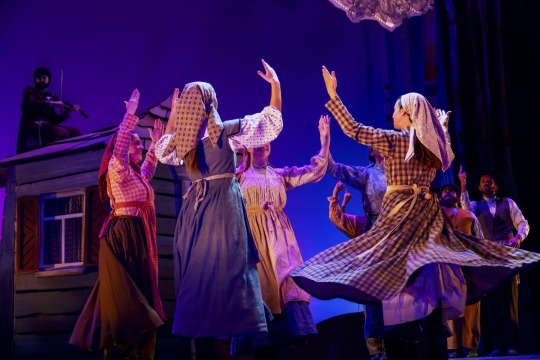
Fiddler on the Roof follows Tevye (Played by John Payonk) and his family in the traditional Jewish town of Anatevka, Russia, in the time leading up to the expulsion of Jews in the area by the Tsar. Throughout the show, Teyve’s three eldest daughters, Tzeitel (Ally Dods), Hodel (Mia Bergstrom), and Chava (Amelia Burkley), get married, with each relationship being more unconventional than the last. It emphasizes the conflict of upholding tradition in the ever-changing world. In the opening number, “Tradition,” it became apparent that this show was comedic, which is something that I did not expect it to be. This opening number also displayed a beautiful choice in production design, with the exception of the very apparent and fake beards, which would only be continuously amplified as the show continued. The combined aspects of stunning designs and strong performances, especially by the male leads, created a world that I had never experienced before and felt deeply connected to.
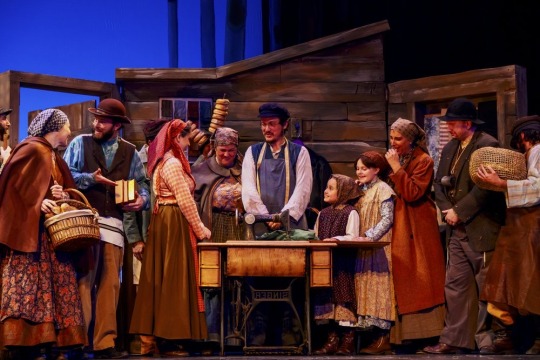
The technical aspects of the show were a favorite of mine. The set, in particular, was visually appealing yet functional at the same time. At all times, watercolor trees adorned the sides of the Proscenium arch, decorated with flowers made of what looked like a tissue paper-like material and hung by chicken wire. The materials allowed for the reflection of light depending on the scene and setting. Hanging over the center-left stage was a circular structure often used as a moon or sun. The simple yet intricate details made the stage feel alive yet had enough room for the large cast. The set pieces, often chairs, tables, or structures, were easily transportable but effective in displaying a new location. This allowed for simple and quick changes between scenes. The most impressive of these was Teyve’s house, which is first seen by the exterior but is opened to reveal the fully furnished interior, which allowed for a new, detailed location in only seconds. For such a long show with many distinct locations, decisions like these were necessary to keep the flow of the show. It is comparable to a show I saw last year, Much Ado About Nothing, wherein this was a significant flaw in the production.
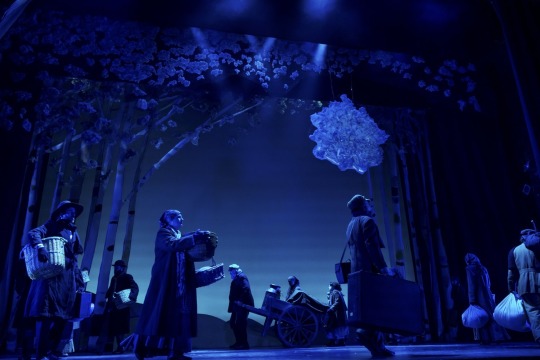
The actors' performances were good, and it felt like they had a genuine familial connection. It was most displayed, expectedly, from Tevye and his wife, Golde (Eva Devirgilis). Altogether, the ensemble of the characters worked well to show the deep connection of the Anatevka Community, especially in Act 1 during “Sabbath Prayer” and during the end of Act 2, “Anatevka.” The comedic and exaggerated performance of Lazar Wolf (Scott Wichmann) was entertaining and, more importantly, allowed for a more significant impact when he and Teyve said their goodbyes at the end of the show.
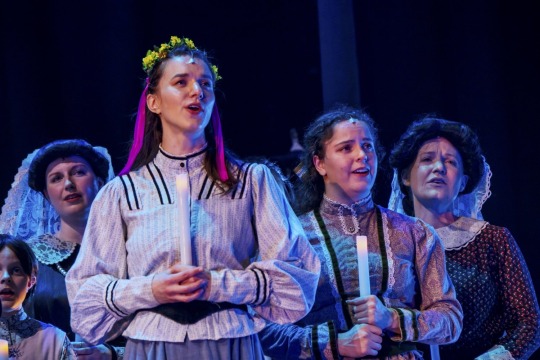
One of the more odd decisions was the vocal mannerisms of two characters in the show, Tevye and the Rabbi’s son (Nick Richardson). Throughout the entirety of the show, Tevye bore a Russian accent. This is expected, as the show does take place in Russia; however, no other actor shared this accent and instead spoke with an American one. I summed this down to the actor possibly being Russian, but this was not true when he gave a remark after the show. Similarly, the Rabbi’s son had a very effeminate voice whenever on stage. This would not normally stick out, but it did not align with the given circumstances or the morals of his character, being one of the more, if not most, traditional characters seen in the show. Despite these odd choices, they did not hinder my overall opinion of the show, but the second did distract me a few times.

Overall, this is definitely my favorite show I have seen by far. Every aspect was phenomenal and any hindrance to the show was minimal. I would definitely recommend anyone to see a production of Fiddler on the Roof.
1 note
·
View note
Text
The Secret Garden - December 2nd 2023
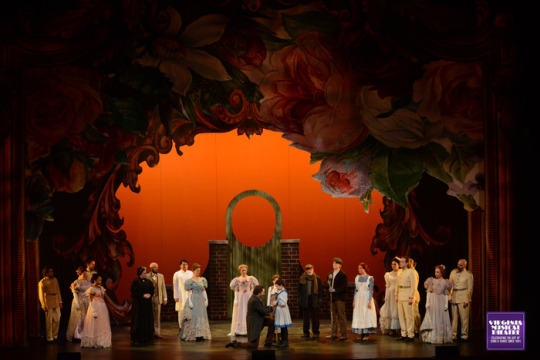
The Secret Garden is a musical based on the book of the same name published in 1911, although with some creative liberties. It follows Mary Lennox, who moves in with her Uncle Archibald Craven due to her parent's death from a Cholera outbreak in India. Archibald has built a garden for Lily, Mary’s Maternal Aunt, before she died in childbirth. Mary is determined to enter the “secret garden” with Colin, Lily’s ill child, Dickon, and Martha. I found the show a little hard to follow, with unclear objectives for the characters and conflicts left unresolved. However, I loved the costume and lighting design, they gave a good visual cue on what would come up later in the show and some insight into the characters in the opening scene(s). Overall it was an enjoyable experience but one that left me very unsatisfied and with lots of questions.
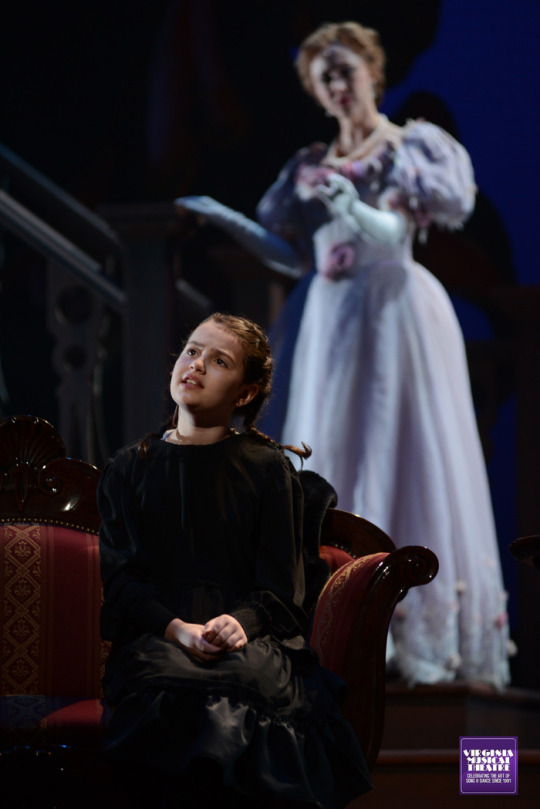
I usually refrain from discussing the writing of a show too much because I am not as educated on that aspect as much as others like acting and design choices, but it was a pretty evident hindrance to this show.. I do not believe the writing of this show is bad, but I think it had an opportunity to expand on the relationships and goals of characters that it did not take. For example, the song “Lily’s Eyes” reveals to us that not just Archibald, but his brother Neville Craven was also in love with Lily. But this conflict, even though it is presented with such extravagance, is never brought up again. However, I understand that often times musicals are limited in dialogue. I wish I had the time and resources to better understand these decisions, but these are the observations I made as an audience member. Opposite to writing, one thing I almost always touch upon are the technical and design aspects of the show. I really loved a point in act 2, when Archibald is reading Mary’s letter. Although dilogue states that he is in paris, the stage was bare. It then leads into “How could I ever know” a duet between Archibald and Lily’s ghost. On top of being an emotional scene, I really loved how Archibald’s grounded costume and Lily’s ghostly one looked in this ‘void’ of blacks and blues. It really helped communicate that while we are seeing her ghost, she isn’t truly there and that this is Archibald coming to terms with the fact that lily’s death was not his fault. Many of the scenes regarding the spirits made for some beautiful scenes. The spirits were dressed in whites, creams, and light blues, while those alive were dressed in more neutral colors that blended in better with the world. Therefore when they were in scenes together, it effectivly showed that they weren’t just flashbacks, but memories these characters were currently experiencing. Little details like these made for the most memrical moments in the whole production, and really deepend the relationships between characters, especially the Cravens.
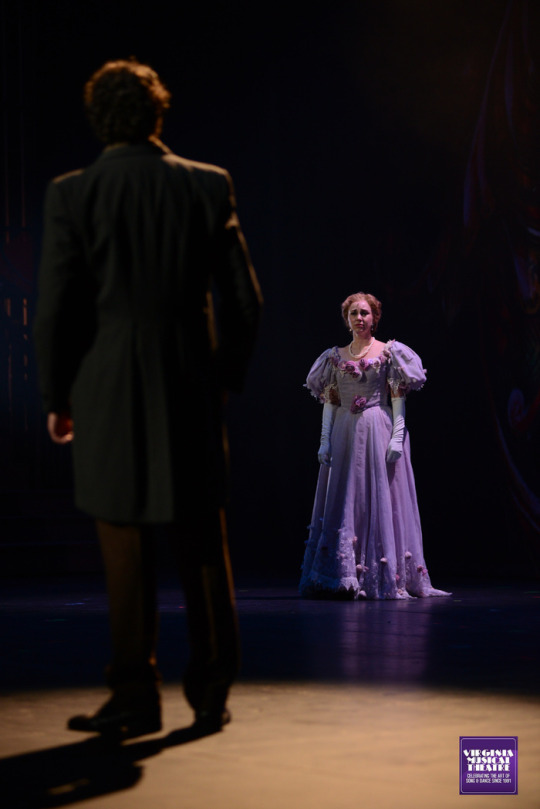
The spatial relationships of the actors throughout the show were utilized very well. Even when all actors were on stage, all of them could be seen and were utilized. They also used shape, sometimes the spirits would circle another actor in a stressful scene, or clump together. I couldn’t help but notice the ghosts acted in their own ensemble inside the larger one, and I found that really neat. I have mentioned the spirits a lot but they truly made some fantastic creative decisions with them.
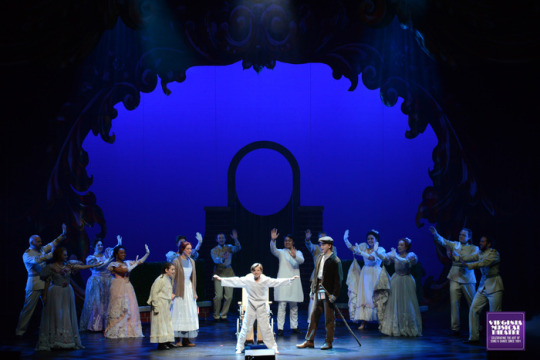
This blog is pretty bad.. honestly, I was trying my hardest to find things to talk about. In the end, this show was simply mediocre. The production itself was beautiful but any story it might’ve had is rushed and forgettable.
3 notes
·
View notes